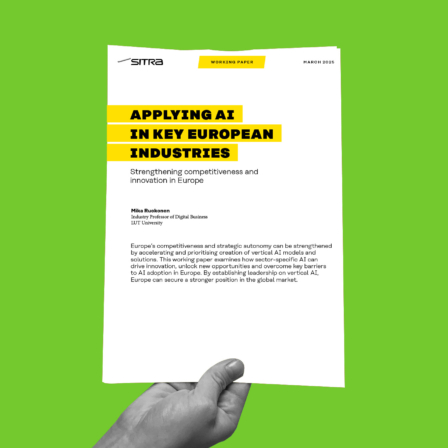Few individual companies have all the information they need, for example about an entire market, products and services. The broader need for information is driving companies to look for new partners. By sharing and combining data with other players, challenges can be addressed that would be difficult for a single company to tackle alone.
An ecosystem Data ecosystem Several data networks can form a data ecosystem, “a network of networks”, in which the members collaborate with each other to share and use data, as well as to boost innovation and new businesses. Open term page Data ecosystem is a collaborative network of actors working together to solve a broader problem. Sharing data across organisational boundaries in ecosystems multiplies the opportunities for business and innovation compared to a single company.
According to a survey commissioned by Sitra, however, up to a third of ecosystems surveyed are still in the early stages of data-sharing collaboration. There are many reasons for this, but it is easy to identify, for example, the technological challenges of data sharing or regulatory factors. However, there is also something else beneath the surface that has not received as much attention – a culture of trust and collaboration in ecosystem activities.
How does ecosystem culture relate to data sharing?
Culture is a broad and diverse concept. In an organisational context, culture usually refers to the beliefs, ideas, values, norms, practices and behaviours shared by people working in a particular organisation, which shape how the organisation operates and its atmosphere.
Ecosystems, on the other hand, are composed of several organisations and their cultures, and therefore the formation of a common culture requires active dialogue and coordination between the members of the ecosystem.
Culture can either support or hinder the use and sharing of data. In an ecosystem with a cautious attitude towards new things, it is more difficult to initiate data-driven experiments than in an ecosystem where the culture encourages experimentation, where the value of data use is recognised and where efforts are made to engender trust between actors.
Three prerequisites for the emergence of a data sharing culture in ecosystems
A shared culture cannot be defined in advance, but emerges over time. However, it is possible to create the right conditions for a culture to emerge from the early stages of an ecosystem.
1. Culture formation requires a sufficient driver
Understanding the value and business benefits of data is a key driver that motivates ecosystem members to invest in building a common culture. The challenge for the ecosystem is that its actors view the value of data from the perspective of their own organisation, rather than the overall value to the ecosystem as a whole or even beyond. By broadening the perspective beyond their own organisation, ecosystem participants can discover surprising ways by which data can deliver value, and this in turn boosts their willingness to invest in building a shared culture.
2. Effective cooperation requires structures and ground rules
Ecosystem structures should support collaboration between different actors. Such structures include, for example, different collaboration platforms where different actors can meet and share lessons learned, common rules and standards to facilitate data interoperability between different actors, and different trust mechanisms such as security agreements. Collaboration is also facilitated by data governance models, which are commonly agreed practices on who can see or process data and how, and of course data regulation. These all contribute to creating a sense of security when new partners are planning joint projects.
3. Trust is the foundation of culture
Trust is the basis for open interaction and cooperation. This is essential in an ecosystem where different actors need to work together towards common goals. To create data-driven business in an ecosystem, data-sharing partners need to trust each other to use the data fairly and in accordance with their common interests. Trust cannot be built in advance, but over time. The Data Economy Rulebook developed by Sitra contains a set of tools for building a data governance model and ground rules to help ecosystems take the first steps towards building trust where there is not yet a track record of experience.
A common culture as a competitive asset for Finnish ecosystems?
We have found that the importance of culture for data sharing in ecosystems is not yet widely discussed in Finland. Data-driven management is mainstream and many organisations are already building their data-driven culture internally. But culture in ecosystems remains an unexplored issue and is not yet sufficiently prominent on the common ecosystem agenda.
Culture is a key element in ecosystems’ efforts to innovate and create new business with data. By identifying practices and success stories that encourage data sharing, and by scaling up the lessons learned, a culture that stimulates data sharing can become a competitive advantage for Finnish innovation ecosystems and Finland can become a pioneer in the data economy.
Technology does nothing if the culture isn’t right.
In our stakeholder workshop, one participant summed up his thoughts well. Technology does nothing if the culture isn’t right. It’s like pouring water in a desert – no flowers will grow.
What’s an ecosystem?
When companies want to collaborate on the basis of fair data sharing and use, it’s best to do so through an ecosystem, a network-like structure that connects different actors.
Finland has several ecosystems in different sectors, consisting of networks of companies, universities, research institutes and third sector organisations.
Ecosystem participants use common rules to share information and expertise and strengthen their own capacity by learning from others.
Ecosystems also seek to innovate and usually aim to solve a broader problem that cannot be solved by the capabilities of individual actors alone.
















Recommended
Have some more.